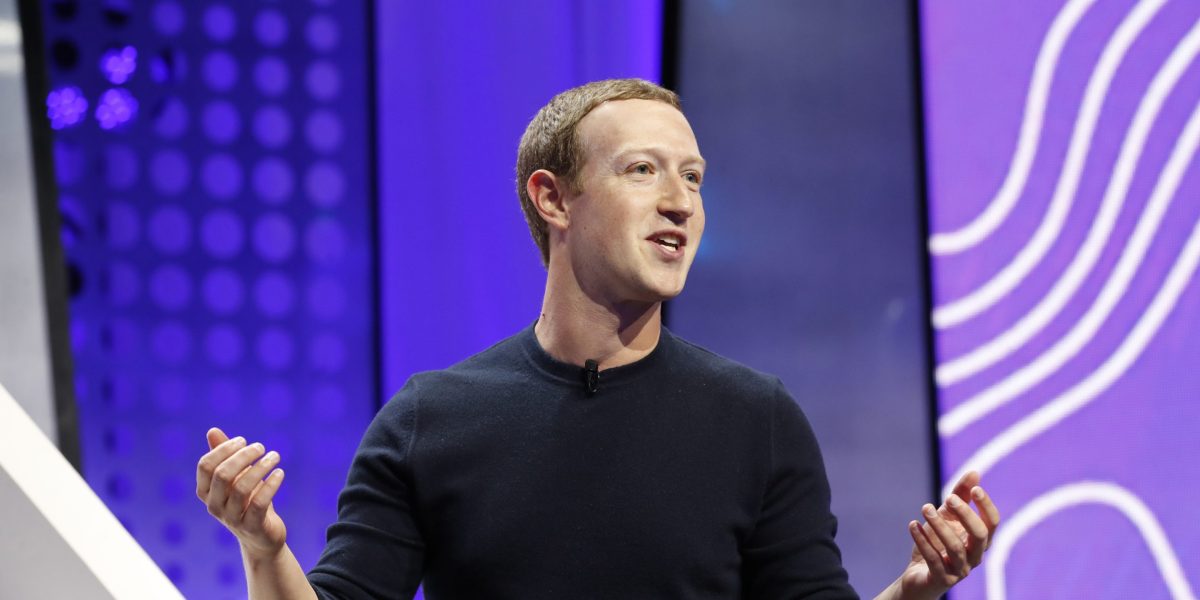SOCIAL
Meta: Mark Zuckerberg and top execs spending most of their time on A.I.

It seems that Mark Zuckerberg has taken his eye off the metaverse for the time being and is instead focussing on the topic of the moment: artificial intelligence.
The top team at social media giant Meta sees A.I. contributing to the metaverse in time, but currently, their focus is to deploy the technology to improve their advertising offering.
That’s according to Andrew Bosworth, Meta’s chief technology officer, who told Nikkei Asia that the company will commercialize its generative artificial intelligence by December—joining a host of other businesses who deployed A.I. products for real-world use in a frenzied first few months of 2023.
Bosworth said that he, as well as CEO and chairman Zuckerberg and Chief Product Officer, Chris Cox, were spending “most” of their time working on a newly-formed A.I. team.
He added: “We feel very confident that we are at the very forefront. Quite a few of the techniques that are in large language model development were pioneered [by] our teams.”
The Reality Labs team leader added Meta had been investing in A.I. for “over a decade” and claims to have “one of the leading research institutes in the world.”
The technology being worked on by the team formed a few months ago can—likeChatGPT—instantly create sentences but also images.
It will be deployed to improve Meta’s advertising offering, with Bosworth—known to staff as ‘Boz’—explaining that instead of a company being pushed to use a single image for a campaign, they can ask the AI to “make images for my company that work for different audiences.”
That will save time and money.
The rollout to make advertising with Meta more attractive will be a lynchpin for the company’s revenue model as a whole.
Advertising is the company’s main revenue stream, having brought in nearly $115 billion in 2021, $112.6 billion in 2023, and estimates of $121.9 billion in 2023 –according to market researchers eMarketer.
Meta against A.I. resistance from Big Tech chiefs
The Facebook and Instagram owner refuses to be deterred by calls to halt progress on developing large language models more intelligent than Chat-GPT4.
Tesla and Twitter CEO Elon Musk and Apple cofounder Steve Wozniak recently signed an open letter calling for a ban on further work until regulation parameters can be put in place.
Yet like Microsoft cofounder Bill Gates, Bosworth isn’t sold on the plan.
His response to the petition, he said, is “no”.
He explained: “I think it’s very important to invest in responsible development and we do that kind of investment all the time. However, it’s very hard to stop progress and make the right decisions on what changes you would make.
“Very often you have to understand how technology evolves before you can know how to protect and make it safe. And so I think, not only is it unrealistic, I don’t think it would be effective.”
His words echo that of Gates, who told Reuters Monday: “Clearly there’s huge benefits to these things…what we need to do is identify the tricky areas.”
Back to the Metaverse
Meta has expressed it wants to tie in its A.I. work with its much-maligned vision for the virtual reality world of the metaverse.
Zuckerberg has been criticized in the past for a blind pursuit to make the digital world a success, despite the dream proving an eye-watering costly endeavor.
Apparently unaffected by the Metaverse bill creeping above $36 billion between 2019 and 2022 alone, Bosworth outlined that A.I. could help develop the landscape within the virtual reality.
“So previously if I wanted to create a 3D world, I needed to learn a lot of computer graphics and programming,” he said.
“In the future, you might be able to just describe the world you want to create and have the large language model generate that world for you. And so it makes things like content creation much more accessible to more people.”
A.I. launches from the likes of Alphabet-owned Google and Microsoft haven’t come off without a hitch, with Google’s Bard flunking questions asked by Fortune, while Microsoft’s Bing told users it “wanted to be alive”.
For Meta, it seems the staff who have avoided being laid off so far have already come up with a way to test the metaverse in a practice known as “dog-fooding”, where employees strap on a Meta VR headset and explore the platform for errors in what is known as a “meta quest”.
SOCIAL
Snapchat Explores New Messaging Retention Feature: A Game-Changer or Risky Move?

In a recent announcement, Snapchat revealed a groundbreaking update that challenges its traditional design ethos. The platform is experimenting with an option that allows users to defy the 24-hour auto-delete rule, a feature synonymous with Snapchat’s ephemeral messaging model.
The proposed change aims to introduce a “Never delete” option in messaging retention settings, aligning Snapchat more closely with conventional messaging apps. While this move may blur Snapchat’s distinctive selling point, Snap appears convinced of its necessity.
According to Snap, the decision stems from user feedback and a commitment to innovation based on user needs. The company aims to provide greater flexibility and control over conversations, catering to the preferences of its community.
Currently undergoing trials in select markets, the new feature empowers users to adjust retention settings on a conversation-by-conversation basis. Flexibility remains paramount, with participants able to modify settings within chats and receive in-chat notifications to ensure transparency.
Snapchat underscores that the default auto-delete feature will persist, reinforcing its design philosophy centered on ephemerality. However, with the app gaining traction as a primary messaging platform, the option offers users a means to preserve longer chat histories.
The update marks a pivotal moment for Snapchat, renowned for its disappearing message premise, especially popular among younger demographics. Retaining this focus has been pivotal to Snapchat’s identity, but the shift suggests a broader strategy aimed at diversifying its user base.
This strategy may appeal particularly to older demographics, potentially extending Snapchat’s relevance as users age. By emulating features of conventional messaging platforms, Snapchat seeks to enhance its appeal and broaden its reach.
Yet, the introduction of message retention poses questions about Snapchat’s uniqueness. While addressing user demands, the risk of diluting Snapchat’s distinctiveness looms large.
As Snapchat ventures into uncharted territory, the outcome of this experiment remains uncertain. Will message retention propel Snapchat to new heights, or will it compromise the platform’s uniqueness?
Only time will tell.
SOCIAL
Catering to specific audience boosts your business, says accountant turned coach

While it is tempting to try to appeal to a broad audience, the founder of alcohol-free coaching service Just the Tonic, Sandra Parker, believes the best thing you can do for your business is focus on your niche. Here’s how she did just that.
When running a business, reaching out to as many clients as possible can be tempting. But it also risks making your marketing “too generic,” warns Sandra Parker, the founder of Just The Tonic Coaching.
“From the very start of my business, I knew exactly who I could help and who I couldn’t,” Parker told My Biggest Lessons.
Parker struggled with alcohol dependence as a young professional. Today, her business targets high-achieving individuals who face challenges similar to those she had early in her career.
“I understand their frustrations, I understand their fears, and I understand their coping mechanisms and the stories they’re telling themselves,” Parker said. “Because of that, I’m able to market very effectively, to speak in a language that they understand, and am able to reach them.”Â
“I believe that it’s really important that you know exactly who your customer or your client is, and you target them, and you resist the temptation to make your marketing too generic to try and reach everyone,” she explained.
“If you speak specifically to your target clients, you will reach them, and I believe that’s the way that you’re going to be more successful.
Watch the video for more of Sandra Parker’s biggest lessons.
SOCIAL
Instagram Tests Live-Stream Games to Enhance Engagement

Instagram’s testing out some new options to help spice up your live-streams in the app, with some live broadcasters now able to select a game that they can play with viewers in-stream.
As you can see in these example screens, posted by Ahmed Ghanem, some creators now have the option to play either “This or That”, a question and answer prompt that you can share with your viewers, or “Trivia”, to generate more engagement within your IG live-streams.
That could be a simple way to spark more conversation and interaction, which could then lead into further engagement opportunities from your live audience.
Meta’s been exploring more ways to make live-streaming a bigger consideration for IG creators, with a view to live-streams potentially catching on with more users.
That includes the gradual expansion of its “Stars” live-stream donation program, giving more creators in more regions a means to accept donations from live-stream viewers, while back in December, Instagram also added some new options to make it easier to go live using third-party tools via desktop PCs.
Live streaming has been a major shift in China, where shopping live-streams, in particular, have led to massive opportunities for streaming platforms. They haven’t caught on in the same way in Western regions, but as TikTok and YouTube look to push live-stream adoption, there is still a chance that they will become a much bigger element in future.
Which is why IG is also trying to stay in touch, and add more ways for its creators to engage via streams. Live-stream games is another element within this, which could make this a better community-building, and potentially sales-driving option.
We’ve asked Instagram for more information on this test, and we’ll update this post if/when we hear back.
-

 MARKETING7 days ago
MARKETING7 days agoEffective Communication in Business as a Crisis Management Strategy
-

 SEO6 days ago
SEO6 days agobrightonSEO Live Blog
-

 SEO5 days ago
SEO5 days agoGoogle March 2024 Core Update Officially Completed A Week Ago
-
SEARCHENGINES6 days ago
Daily Search Forum Recap: April 25, 2024
-

 WORDPRESS5 days ago
WORDPRESS5 days ago9 Best WooCommerce Multi Vendor Plugins (Compared)
-

 MARKETING4 days ago
MARKETING4 days agoNavigating the Video Marketing Maze: Short-Form vs. Long-Form
-

 SEARCHENGINES5 days ago
SEARCHENGINES5 days agoGoogle March 2024 Core Update Finished April 19, 2024
-

 WORDPRESS7 days ago
WORDPRESS7 days agoYour New Favorite Way to Develop WordPress Locally – WordPress.com News












![The Current State of Google’s Search Generative Experience [What It Means for SEO in 2024] person typing on laptop with](https://articles.entireweb.com/wp-content/uploads/2024/04/The-Current-State-of-Googles-Search-Generative-Experience-What-It.webp-80x80.webp)
